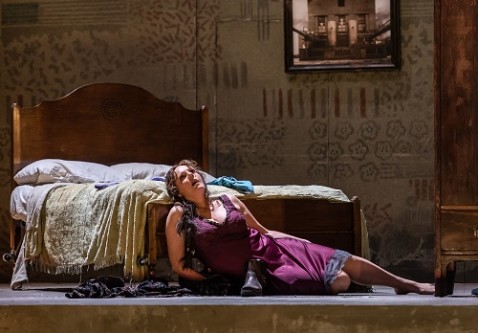 United Kingdom Shostakovich, Lady Macbeth of Mtsensk (original version, 1934): Soloists, Chorus and Orchestra of the Royal Opera House / Sir Antonio Pappano (conductor). Royal Opera House, Covent Garden, 12.4.2018. (CC)
United Kingdom Shostakovich, Lady Macbeth of Mtsensk (original version, 1934): Soloists, Chorus and Orchestra of the Royal Opera House / Sir Antonio Pappano (conductor). Royal Opera House, Covent Garden, 12.4.2018. (CC)

Cast:
Katerina Ismailova – Eva-Maria Westbroek
Boris Ismailov – John Tomlinson
Zinovy Ismailov – John Daszak
Sergey – Brandon Jovanovich
Aksinya – Rosie Aldridge
Shabby Peasant – Peter Bronder
Priest – Wojtek Gierlach
Police Inspector – Mikhail Svetlov
Teacher – Thomas Atkins
Old Convict – Paata Burchuladze
Sonyetka – Aigul Akhetshina
Female Convict – Miranda Keys
Steward / Sentry – Simon Shibambu
Coachman/Second Workman – Hubert Francis
Production:
Director – Richard Jones
Revival director – Elaine Kidd
Sets – John Macfarlane
Costumes – Nicky Gillibrand
Lighting – Mimi Jordan Sherin
Original choreographer – Linda Dobell
This, surely, is the Royal Opera at its very best. Under the precise but expressive direction of Sir Antonio Pappano, the orchestra excelled in Shostakovich’s difficult writing, not least from the strings but with some magnificent individual contributions, including a simply fabulous clarinet solo early on and some fabulous cor anglais playing later. The solo violin in Scene 3 is miraculous. The brass players, both onstage and in a high box, were simply resplendent. And how better to celebrate Sir John Tomlinson’s 40 years at Covent Garden (he debuted in 1977 as Fifth Jew in Salome) than to see and hear him as the merchant Boris Ismailov and father of Katerina Ismailova’s husband, Zinovy.
The production, by Richard Jones, was last revived in 2006, and here boasts Elaine Kidd as revival director. The set designs, by Richard Macfarlane, update the action to the 1950s/1960s, often using a split stage to great effect. The world of the Ismailovs and their workers (from which Sergey, the virile lover, hails) is insular, a microcosm of hierarchy rotten to its core, as the scenes of sexual degradation confirm. The rape of Aksinya, a part well taken by Rosie Aldridge, is difficult to watch, as it should be. Values are inverted and perverted, and the production pulls no punches in showing how herd mentality in crowd scenes, wonderfully portrayed by a top of their game Royal Opera Chorus, can be visceral indeed. The garish nature of the wallpaper, the black and white television with its wrestling (seen as more mindless violence) all point up the lurid basis of Leskov’s story. The gloves-off nature of the production perfectly matches the raw nature of Shostakovich’s score, here heard in the original 1934 version, just as the bare hopelessness of the setting for the final act, with its backs of two darkly-lit transportation wagons, fits the hopelessness of the story and indeed the music while the sense of macabre farce and angular comedy earlier on acts as high contrast.
Both Eva-Maria Westbroek and Sir John Tomlinson were present in the 2006 revival, in which Westbroek made her company debut; Tomlinson had performed it previously in 2004. Westbroek has made quite an impression over the years: her creation of the titular role in Anna Nicole was notable in 2011(click here), while her Santuzza in 2015 was remarkable (click here). Here she takes the role by the lapels and runs with it, tracking the character’s path to murderess via moments of tenderness that project in their quieter moments throughout the Covent Garden space. She has stage presence, too, although perhaps here this was diluted by her proximity to Tomlinson; yet her final act monologues were riveting, the use of a square spotlight, again representing confines to her life and tragic actions, highly effective.
On a few occasions over the last decade Tomlinson’s voice has appeared woolier, less focused and less powerful than his glory days, which one assumed was a natural part of the ageing process. Not so here, however, in an assumption of the part of Boris Ismailov, the brutish merchant. He owned the stage at each and every appearance, the embodiment of male power and an archetypal overbearing letch. The performance was everything one might hope for in this celebration of a great man’s contribution.
Making his ROH debut, American tenor Brandon Jovanovich was an eminently believable Sergei, a role he has recently sung both at the Vienna State Opera and at the Salzburg Festival. His voice is strong and large (he will sing Walther von Stolzing in Die Meistersinger for Paris Opéra and San Francisco Opera, for example) and his presence virile; he makes the perfect foil for the deliberately blander Zinovy Ismailov of John Daszak.
One of the strongest portrayals of the evening in a performance that set the bar stratospherically high was mezzo Aigul Akhmetchina’s coquettish floozy Sonyetka. Surprisingly the only Russian in the cast (difficult to believe if one closed one’s eyes and listened to the diction), Akhmetchina embraced the sordidness of her part with supreme aplomb. Akmetshina is a Jette Parker Young Artist and clearly has a fine career ahead of her. She is next up at Covent Garden as Preziosilla (La forza del destino).
The smaller roles of Shabby Peasant (Peter Bronder) and, in particular, the Priest of Polish bass Wojtek Gierlach, are well taken. Gierlach’s voice has huge resonance; nice to see Paata Burchuladze as the Old Convict, too.
The performance on April 27 will be recorded by BBC Radio 3 for future broadcast.
Colin Clarke
